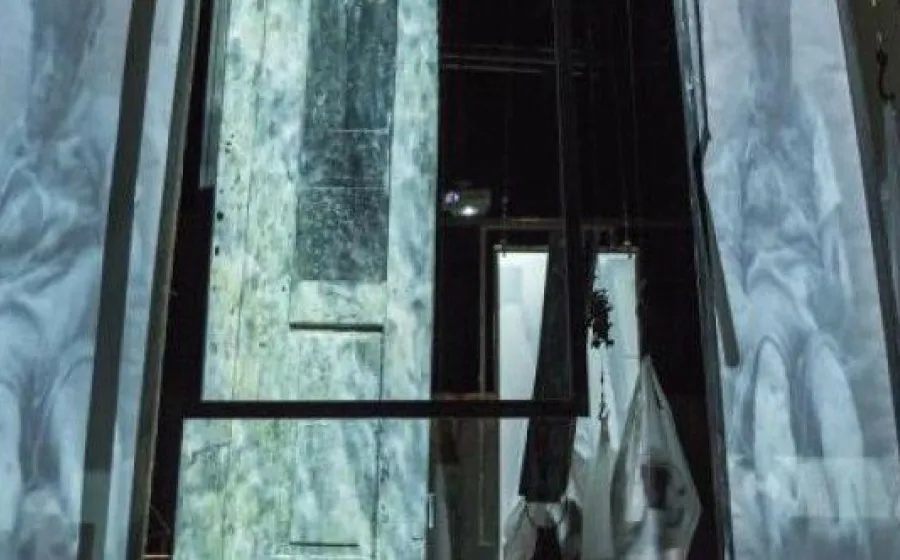MY EYE IS MY COUNTRY
Teatr ZAR
Date
25 November
2 December 2017
Location
Nave 11. Sala Fernando Arrabal
Price
Free entry
Age recommendation: 16+
Institution
Naves Matadero
My Eye is My Country is an installation that presents the songs, tales and voices of refugees as part of the set design of Medeas. On Getting Across. The residents of refugee camps, women and children, document their lives with cameras, smart phones, etc., trying to offer a vision of their lives from an outside perspective. The installation was created in a process that lasted two weeks, followed by intensive workshops aimed at selecting and assembling material. It doesn’t consist of films about the voyage to Europe but rather stories about what is currently happening. For most visitors, this will be the only way they can hear and see what migrants from different parts of the world have to bear and suffer.
About Teatr Zar
Teatr ZAR was formed at the Jerzy Grotowski Institute (Poland) over the course of research expeditions to Georgia between 1999 and 2003. On these trips they compiled a large amount of musical material, and in their opinion they may have found the oldest polyphonic compositions in the world. “Zar” is the name of the funeral songs sung by the Svans, a people of the highlands of the Caucasus region in northeast Georgia). Teatr ZAR aims to prove that theatre should not only be seen but that –above all– it needs to be heard. Its performances are part of a long process of research, travel, personal exploration and transformation. Once again, they bring us theatre as it used to be, before the art splintered into different disciplines and styles, tackling songs that in our era seem to be reserved solely for religion, drawing on the Polish Romantic belief that the aim of this art form is not just to complement the religious movement but also to be able to fill the dynamic void between daily life and transcendence. Juliusz Osterwa, one of the few who tried to put these ideas into practice and whose thinking inspired J. Grotowski, said: “God created theatre for those for whom the Church wasn’t enough”.
Teatr ZAR’s first big hit was its Gospel of Childhood trilogy. Produced between 2003 and 2009, it was the culmination of research spanning over ten years and of the evolution of the company itself. It premiered in the Barbican Centre in London and toured cities like Los Angeles, San Francisco, Florence, etc. It was named Best New Music Theatre by the Los Angeles Times and was performed at the Edinburgh Fringe Festival in 2012, where it won the Total Theatre Award in the physical theatre category as well as the Herald Angel Award. In 2011 the group began to focus on the project Armine, Sister, dedicated to the history and culture of the Armenian nation which occupies Anatolia and the extermination of Armenians carried out in the early 20th century. The project was developed via expeditions and research into Armenian history and tradition, and one of its key concepts is to tackle the question of taboo and the hypocrisy of history contrasted against the duty to give testimony.
Credits Concept: Jarosław Fret and Simona Sala
Construction: Paweł Nowak
Idea of flags: Luca Poncetta
About Teatr Zar
Teatr ZAR was formed at the Jerzy Grotowski Institute (Poland) over the course of research expeditions to Georgia between 1999 and 2003. On these trips they compiled a large amount of musical material, and in their opinion they may have found the oldest polyphonic compositions in the world. “Zar” is the name of the funeral songs sung by the Svans, a people of the highlands of the Caucasus region in northeast Georgia). Teatr ZAR aims to prove that theatre should not only be seen but that –above all– it needs to be heard. Its performances are part of a long process of research, travel, personal exploration and transformation. Once again, they bring us theatre as it used to be, before the art splintered into different disciplines and styles, tackling songs that in our era seem to be reserved solely for religion, drawing on the Polish Romantic belief that the aim of this art form is not just to complement the religious movement but also to be able to fill the dynamic void between daily life and transcendence. Juliusz Osterwa, one of the few who tried to put these ideas into practice and whose thinking inspired J. Grotowski, said: “God created theatre for those for whom the Church wasn’t enough”.
Teatr ZAR’s first big hit was its Gospel of Childhood trilogy. Produced between 2003 and 2009, it was the culmination of research spanning over ten years and of the evolution of the company itself. It premiered in the Barbican Centre in London and toured cities like Los Angeles, San Francisco, Florence, etc. It was named Best New Music Theatre by the Los Angeles Times and was performed at the Edinburgh Fringe Festival in 2012, where it won the Total Theatre Award in the physical theatre category as well as the Herald Angel Award. In 2011 the group began to focus on the project Armine, Sister, dedicated to the history and culture of the Armenian nation which occupies Anatolia and the extermination of Armenians carried out in the early 20th century. The project was developed via expeditions and research into Armenian history and tradition, and one of its key concepts is to tackle the question of taboo and the hypocrisy of history contrasted against the duty to give testimony.
Credits Concept: Jarosław Fret and Simona Sala
Construction: Paweł Nowak
Idea of flags: Luca Poncetta

